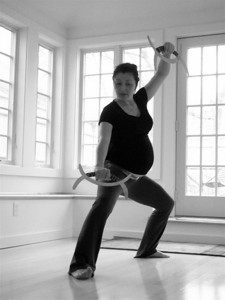 If you’re pregnant and an athlete, then you’re probably wondering if it’s safe for you to continue doing a pregnancy workout at a high rate of intensity?
If you’re pregnant and an athlete, then you’re probably wondering if it’s safe for you to continue doing a pregnancy workout at a high rate of intensity?
It can be really confusing trying to figure out what kind of pregnancy workout you can safely do during the months that you’re pregnant.
Of course, pregnant women need to exercise in order for a healthy pregnancy. In fact, many say that women need even more exercise when they’re pregnant.
In the past, doctors suggested that all pregnant women should not have a heart rate of over 140 beats per minute while exercising, but that view is changing.
Thanks to James Clapp MD, the author of Exercising Through Your Pregnancy, pregnant athletes now have some solid support.
We now know that women who were athletic before becoming pregnant can safely have a higher heart rate while exercising.
Keep in mind, this only applies to female athletes who have been training at high intensities prior to becoming pregnant. All other moms-to-be should adhere to the 140 beats per minute number and nothing higher.
The key thing to remember is that a pregnant athlete must be properly trained and monitored, and she must have been exercising at a high intensity prior to her pregnancy.
There are 3 areas that concern doctors when it comes to exercise and the fetus:
- Injuries received while practicing sports. Contact sports like hockey, boxing, and soccer should be avoided. High-risk sports like gymnastics and horseback riding should also be avoided when pregnant.
- Hyperthermia. This is when the body temperature becomes higher than normal during exercise. The problem is the fetus can take on the mother’s heat, and this can lead to birth defects. So, a pregnant athlete’s temperature needs to be monitored carefully before and after exercise.
- Lack of oxygen. This is primarily a concern if the pregnant woman is unfit — because if the mom-to-be exercises at high intensity, it can decrease her uterine blood flow and cause the fetus to get less oxygen. However, even pregnant athletes need to make sure they have a cool down period and that they pay attention to their baby’s movements in the hours after exercise — because, just like people, a fetus will stop moving if it is not getting enough oxygen.
Some pregnant athletes as recently as 2007 actually kept their pregnancy secret and continued playing rough contact sports like basketball at high intensity up until their 8th month. The reason for this was they were afraid they would lose their scholarships. Fortunately, the NCAA changed the rules and passed legislation making it possible for these female athletes to retain their full scholarships, even if they become pregnant.
My favorite things to write about are topics that have to do with pregnancy, weddings, saving money, living green, and life with dogs. When I’m not writing, I love to spend time with my husband, read, create 3D artwork and Native American beadwork.






